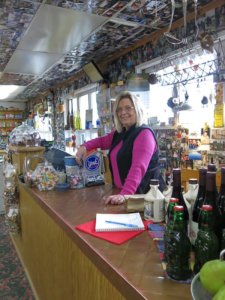Neighbor’s well could derail Spear’s Store plans
In East Charlotte, two permits stand at an impasse. Richard Tenney got one to build a new well. Carrie Spear needs one to add septic to her store. There is only room for one of them, and it’s not clear who will get what they want.

For twenty years, Spear’s Corner store has been a fixture of East Charlotte, but Spear and her husband have decided it’s time to move on. All that the store was missing was a deli and an apartment. In October of last year, Spear applied for a conditional use permit for the improvements.
The planned improvements increase the water and septic supply capacity, and require a new wastewater permit. According to the Vermont Wastewater System and Potable Water Supply Rules, the minimum distance between a septic system and a drilled well is at least 50-100 feet. Tenney’s and Spear’s properties are too close to each other for both.
Spear’s application for the deli got conditional approval on Tuesday after months of deliberation. In the initial Zoning Board of Adjustment (ZBA) meeting to discuss the application, Frank Tenney, Richard’s brother, recused himself. Frank is the chair of the Zoning Board. However, Frank participated in a half-dozen emails about the application with the ZBA prior to his recusal.
This Wednesday’s ZBA meeting where the application was to be discussed was cancelled without Spear’s knowledge. According to Town Planner Larry Lewack, the meeting was cancelled because a decision to approve the changes had already been made.
Richard Tenney owns Tenney’s Snack Bar and bottle redemption center next door, and his daughter operates Brit-Sue’s Greenhouse from the same property. He submitted a draft permit for a well on February 12, and received approval that day.
With both projects approved, a new problem arose. Which takes precedence? The conditional approval for the deli necessitates a septic system, but according to Lewack, if the well gets put in first, the septic permit wouldn’t be granted “because the two properties are next door to each other. It would be a problem to have permits issued either before or at the same time.”
Vermont’s Wastewater Systems and Potable Water Supplies Rules require an isolation zone around both potable water supplies and wastewater systems where no contaminants or potable water supplies can be built, respectively. These zones are colloquially known as “well shields” and “septic shields.” When a well or septic shield extends from one property to another, this is termed “overshadowing,” an issue about which the Technical Advisory Committee wrote a report on in 2010. The problem Lewack referenced is the “first-in-time” rule, which grants the permit to whoever applied for it first, even if it affects an adjacent property.
When Lewack was asked if Spear’s application would preclude the well permit since it was in the works since October, but hadn’t been approved yet, he said, “I don’t know the answer to that. It’s a fair question. As soon as I found out about the issue I did bring it to the attention of our interim zoning administrator.”
Interim Zoning Administrator Jeannine McCrumb did not respond to a request for comment at press time.
Richard Tenney told The Charlotte News he did not want to talk about the well. Frank Tenney did not immediately respond to a request for comment.
Carrie Spear declined to comment for this article.
